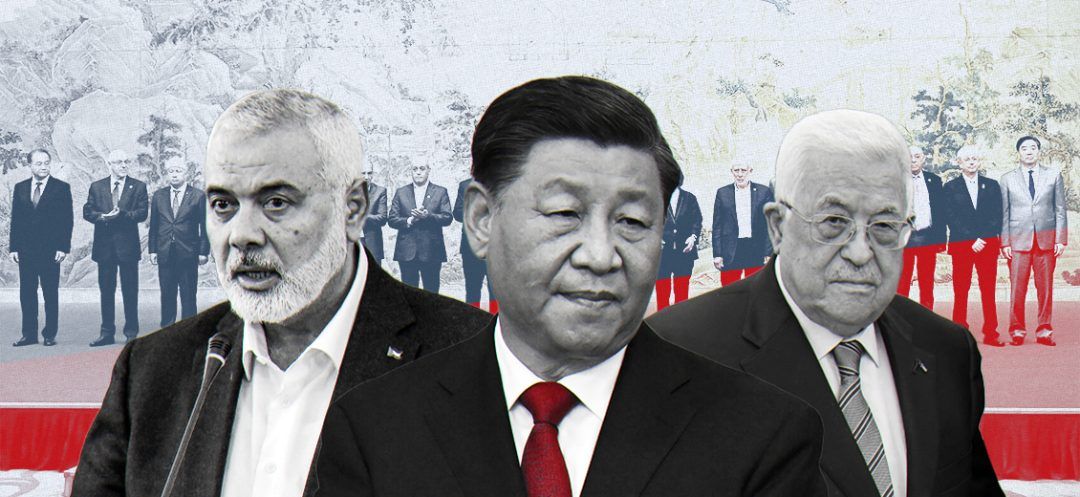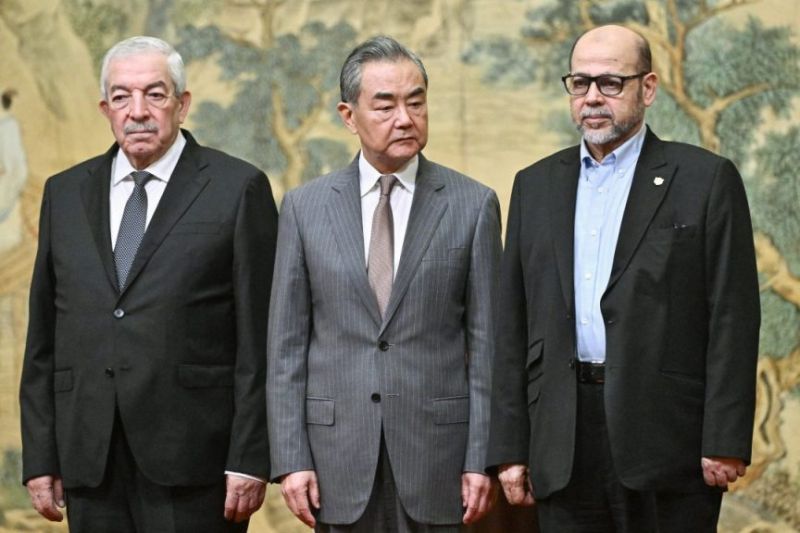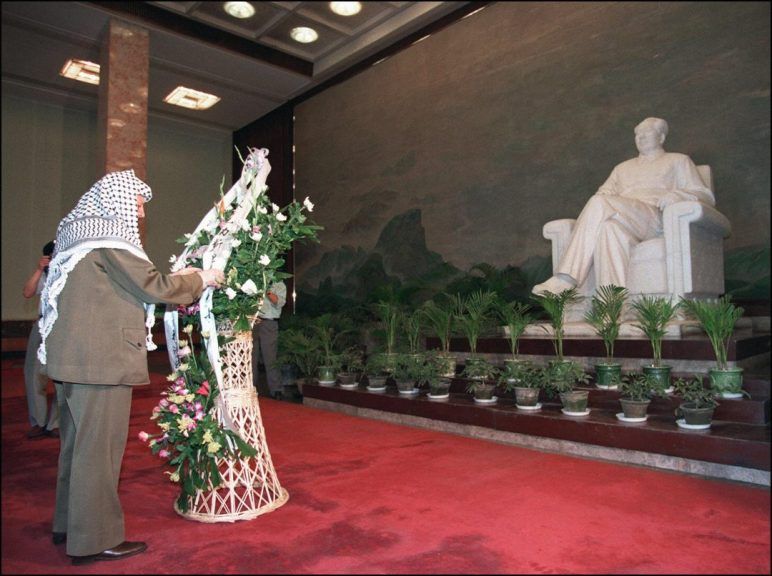- Home
- War in the Middle East
- China: Navigating the Gordian Knot of Palestinian Rivalries

Palestinian factions announced the signing of a “national unity” in agreement on Tuesday, July 23, in Beijing. This is Beirut spoke with researcher Guy Burton, a specialist in Sino-Middle Eastern relations, to highlight China's role in the Levant.
On Tuesday, July 23, Musa Abu Marzouk, a senior official in Hamas’ political bureau, announced that his movement had signed an agreement with other Palestinian factions, including its rival Fatah, following three days of negotiations in Beijing.
One of the key components of the agreement is the “establishment of an interim national reconciliation government for post-war governance in Gaza,” according to Chinese Foreign Minister Wang Yi.
[readmore url="https://thisisbeirut.com.lb/world/274356"]
This new diplomatic success underscores China's efforts to assert itself in the Middle Eastern diplomatic arena. Specifically, Beijing is intensifying its efforts on the region's longest-standing conflict between Israel and Palestine, with a substantial increase in activity since October 7, 2023.
A Potential Mediator
Beijing appears well-positioned to play a crucial role in reconciling Hamas and Fatah. If Chinese diplomacy succeeds, it would further cement China’s role as a powerful mediator, following its successful facilitation of the Iran-Saudi Arabia rapprochement in March 2023.
Interviewed by This is Beirut, researcher Guy Burton, a specialist in China-Middle East relations, asserts that “China’s ties with Hamas are modest, although more important compared to those of several other states, particularly Western ones.” However, while it is challenging for these states to directly engage with the Islamist movement, Beijing does not face this problem.
 L-R) Mahmoud al-Aloul, Vice Chairman of the Central Committee of Palestinian organisation and political party Fatah, China's Foreign Minister Wang Yi, and Mussa Abu Marzouk, senior member of the Palestinian Islamist movement Hamas, attend an event at the Diaoyutai State Guesthouse in Beijing on July 23, 2024.
L-R) Mahmoud al-Aloul, Vice Chairman of the Central Committee of Palestinian organisation and political party Fatah, China's Foreign Minister Wang Yi, and Mussa Abu Marzouk, senior member of the Palestinian Islamist movement Hamas, attend an event at the Diaoyutai State Guesthouse in Beijing on July 23, 2024. On the Palestinian side, this new investment—though modest—could reinforce Hamas' international standing. However, it may also provoke the ire of Fatah, which has until now maintained a central position in this matter.
This presents a risk for Chinese diplomats: the potential to become entangled in the rivalries they sought to resolve. This is especially true if they “move from their role as facilitators to become more active mediators,” warns the researcher.
A Historical Support
On the Israeli-Palestinian conflict, the Middle Kingdom (China) advocates for a two-state solution, particularly within the UN Security Council. This position reflects its longstanding support for Palestine.
China has been a lasting supporter of the Palestinian cause. Burton notes that it has demonstrated “great coherence in its rhetoric on the Palestinian issue.”
However, while Beijing constantly reaffirms its current stance, this was not always the case. “From the mid-1960s to the early 1970s, China supported the Palestine Liberation Organization (PLO) and its armed struggle,” notes Burton, referring to the Maoist era.
 (FILES) Former President of the Palestine Liberation Organization (PLO) and the Palestinian Authority, Yasser Arafat, pictured on June 19, 1996 in Beijing as he adjusts a wreath during a ceremony in front of the statue of Mao Zedong, on the occasion of his tenth visit to China. (AFP)
(FILES) Former President of the Palestine Liberation Organization (PLO) and the Palestinian Authority, Yasser Arafat, pictured on June 19, 1996 in Beijing as he adjusts a wreath during a ceremony in front of the statue of Mao Zedong, on the occasion of his tenth visit to China. (AFP)Nevertheless, several geopolitical and internal factors in the country led to an evolution in Beijing's position during the 1970s. “China became a soberer and more limited actor, establishing diplomatic relations with Israel in 1992 and later supporting the Oslo Accords,” recalls the researcher.
At the same time, China has strengthened its economic ties with the Hebrew State and became a major trading partner. Bilateral exchanges spanning high technology, innovation and infrastructure now reach several billion dollars.
Marginal Economic Ties
This contrasts sharply with Sino-Palestinian economic relations. While China, like many other regional countries, is a major supplier of goods to the Palestinian territories, the trade remains totally imbalanced.
For example, China exported “$180 million worth of goods in 2022, when Palestine exported only $49,000 worth to China that same year,” notes Burton. “Furthermore, the value of Chinese goods in Palestine has increased, while the value of Palestinian exports has decreased,” the specialist adds.
These figures emphasize that Palestine is a minor economic player compared to Middle Kingdom. This position of weakness is also apparent in the context of the “the new silk roads,” or Belt and Road Initiative (BRI).
[readmore url="https://thisisbeirut.com.lb/videos/264038"]
Guy Burton recalls that the two actors “signed a memorandum of understanding on the regional cooperation initiative in December 2022, but there appears to have been little progress since then.” Besides the size of the Palestinian market, the researcher highlights “China’s concerns about the risks of investing in an uncertain environment like Palestine,” within the framework of its mega-project.
The same applies to economic aid, where Chinese contributions are relatively modest, with $2 million allocated to United Nations Relief and Works Agency for Palestine Refugees in the Near East (UNRWA) in 2023. “Comparatively, the United States provided $420 million, Germany $213 million, and the European Union (EU) $120 million,” notes Burton.
Political Concern
The researcher argues that China regards Palestine more as a “political concern than an economic one.” In this context, the current conflict is notably different from previous ones, “China has taken a more critical stance toward Israel this time. It was slow to condemn the Hamas attack on October 7, a delay that did not go unnoticed by the Israelis.”
This stiffening should be viewed in contrast to the American stance, with the US being an unwavering ally of Israel. By adopting a more virulent position than its primary geopolitical rival, Beijing aims to distinguish itself diplomatically and to appear as an alternative to Washington in the region.
However, Guy Burton tempers this shift in stance, considering it more rhetorical than substantive. “In terms of tangible assistance, China has not made significant impact on the ceasefire negotiations between Israel and Hamas, leaving Egypt and Qatar to dominate,” recalls Burton. The researcher also suggests that the mistrust of Israeli officials towards China is not surprising.
Palestinian Gordian Knot
Nevertheless, Beijing’s challenge will be to ensure that the expression of unity, declared on Tuesday in its capital, leads to lasting cohesion among the Palestinian factions. “The mistrust between the factions is huge that it’s difficult to know what the Chinese think they can do to narrow the gap,” cautions Guy Burton.
Indeed, unlike the current negotiations, Beijing’s role in the Iran-Saudi Arabia talks “was merely the final phase of a broader process that had involved mediation by Qatar and Iraq,” notes the researcher. In contrast, the negotiations earlier this week appear to be just the beginning of a long and complex journey.
But the real question is whether China truly intends to invest long-term in this process. The latter could be risking its political credibility “without any guarantee of success,” insists the researcher. Indeed, Chinese diplomacy enjoys to consistently highlight its strict attachment to a policy of non-interference in other countries' internal affairs.
According to Guy Burton, if China aims to “be more involved in the conflict and the associated peace processes, it must move beyond simply reiterating its support in favor of the two-state solution.” This stance could demonstrate a long-term admission of weakness on the issue.
In other words, Beijing's representatives will need to make a more substantial effort to achieve meaningful results from these negotiations. With the ongoing Sino-American rivalry in the region, “there is a significant prize at stake, but also considerable risks if they fail,” concludes Burton. With the goal of positioning Beijing as a global diplomatic power.

Comments